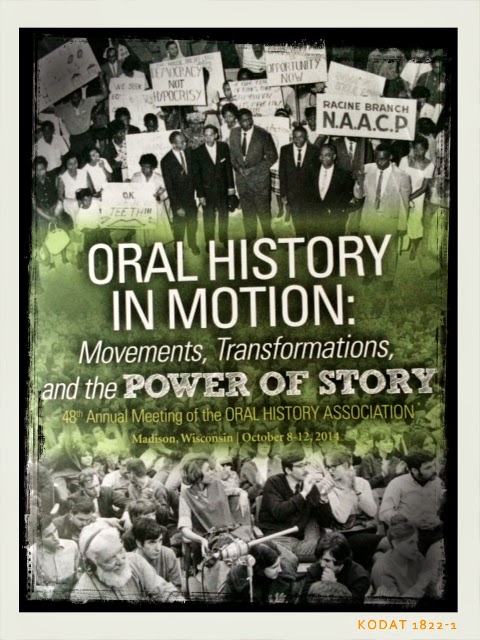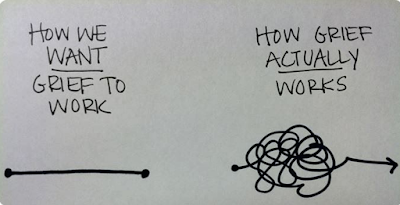"Humbling Moments" at the Oral History Association Meeting
While I wait in the airport for my husband to finish running a half marathon and then drag himself to come get me, it's a good time to write a quick post about the 2014 Oral History Association Meeting in Madison, Wisconsin.
It was my first OHA meeting. Seasoned oral historians and experts on reflection and analysis of the interview process Stacey Zembrzycki and Anna Sheftel invited me to participate in a roundtable conversation on humbling moments because of my insistence on discussing failure in community collaborations more openly last spring at the 2014 National Council on Public History annual meeting.
The panel also included the trailblazing feminist oral historian Sherna Berger Gluck and Janis Thiessen, a thoughtful and critical historian of Canadian labor, business and religion. We had really good attendance and a remarkably rich and flowing conversation, given the fact that there were about forty people in the room.
The comments that people posted on our live polling screen in real time were fantastic and reflective of the kinds of issues, questions and dilemmas facing oral historians. They are also telling about issues facing collaborative practitioners of all kinds who want to "go public" with difficult issues surrounding their practice. After the panel, everyone who stopped to say hi and chat about it in in the corridors and during the coffee break mentioned that it really made them think about their own experiences in the field and what they might be able to learn from them that could make a difference in both how they do what they do and also in how they approach setbacks. Mission accomplished, I'd say.
I talked about issues of over-disclosure on the part of interviewees and the things that can come out of those interview moments. I have a clear moral compass about the obvious things --- I generally know when people have gone farther than they wanted to or thought they would and I don't consider confessional, raw recordings "mine" to use. Since my process involves reviewing anything that will be published with interviewees beforehand, I don't get stuck using material that interviewees regret; it also helps with the issue of privileged interpretations on my part. But this was a big part of our discussion. It is easy to do that when you have sympathy with your interviewees' perspectives, but unlikable, offensive, even dangerous perspectives on the part of interviewees also need to enter the historical record, right? We cannot simply record and publish the perspectives that align with our own.
And for me, at least, the question of what to do when you realize that an entire interview was shaped by something very specific and that this kernel shaped and directed all other information that was revealed? What do you do when you arrive at "the thing" the interviewee wanted to share with you and see how clearly that everything else has been simply a prelude to those memories? If you want to use the interview as evidence, is that evidence legitimate? As Amber Abbas noted, if we insist on seeing the present in the past, is it possible that we can also see the past in the present? Important questions, important conversation.
The conference was also humbling in the best possible ways. There were some extremely bright scholars sharing their work and I had the opportunity to listen to papers and talk about projects with women whose research inspired me tremendously. There's Amber Abbas, who is giving voice to the period of transition associated with the 1947 Independence and Partition of India and its particular impact on South Asian Muslims. I really liked the deeply thoughtful work of Anna Muller on the ways Polish activist Anna Walentynowicz's romantic narratives about her life, her work and the significance of both were shaped by and shaped by notions of quest. And Sevil Cakir's oral histories of women involved in leftist guerilla movements in Turkey and Iran in the 1970s is pretty fascinating, troubling and important.
When it was all over, I went adventuring and found myself at the Kettle Moraine State Forest, 60 miles east of Madison. Whitewater Lake is huge, and lovely -- I only caught a glimpse of it. Not quite fall in New England, but pretty darn close.
Conferences are exhausting and my brain always goes into overdrive, no matter what. But this year's OHA offered a nice balance -- between time with friends, a lovely and warm bunch of conference attendees, plenty of interesting questions and issues to consider and down time between Madison and Milwaukee, where I flew in and out of, this was a remarkably sane and salutary conference experience!
It was my first OHA meeting. Seasoned oral historians and experts on reflection and analysis of the interview process Stacey Zembrzycki and Anna Sheftel invited me to participate in a roundtable conversation on humbling moments because of my insistence on discussing failure in community collaborations more openly last spring at the 2014 National Council on Public History annual meeting.
The panel also included the trailblazing feminist oral historian Sherna Berger Gluck and Janis Thiessen, a thoughtful and critical historian of Canadian labor, business and religion. We had really good attendance and a remarkably rich and flowing conversation, given the fact that there were about forty people in the room.
 |
| image by Erica Fugger |
I talked about issues of over-disclosure on the part of interviewees and the things that can come out of those interview moments. I have a clear moral compass about the obvious things --- I generally know when people have gone farther than they wanted to or thought they would and I don't consider confessional, raw recordings "mine" to use. Since my process involves reviewing anything that will be published with interviewees beforehand, I don't get stuck using material that interviewees regret; it also helps with the issue of privileged interpretations on my part. But this was a big part of our discussion. It is easy to do that when you have sympathy with your interviewees' perspectives, but unlikable, offensive, even dangerous perspectives on the part of interviewees also need to enter the historical record, right? We cannot simply record and publish the perspectives that align with our own.
And for me, at least, the question of what to do when you realize that an entire interview was shaped by something very specific and that this kernel shaped and directed all other information that was revealed? What do you do when you arrive at "the thing" the interviewee wanted to share with you and see how clearly that everything else has been simply a prelude to those memories? If you want to use the interview as evidence, is that evidence legitimate? As Amber Abbas noted, if we insist on seeing the present in the past, is it possible that we can also see the past in the present? Important questions, important conversation.
The conference was also humbling in the best possible ways. There were some extremely bright scholars sharing their work and I had the opportunity to listen to papers and talk about projects with women whose research inspired me tremendously. There's Amber Abbas, who is giving voice to the period of transition associated with the 1947 Independence and Partition of India and its particular impact on South Asian Muslims. I really liked the deeply thoughtful work of Anna Muller on the ways Polish activist Anna Walentynowicz's romantic narratives about her life, her work and the significance of both were shaped by and shaped by notions of quest. And Sevil Cakir's oral histories of women involved in leftist guerilla movements in Turkey and Iran in the 1970s is pretty fascinating, troubling and important.
 |
| Whitewater Lake |
Conferences are exhausting and my brain always goes into overdrive, no matter what. But this year's OHA offered a nice balance -- between time with friends, a lovely and warm bunch of conference attendees, plenty of interesting questions and issues to consider and down time between Madison and Milwaukee, where I flew in and out of, this was a remarkably sane and salutary conference experience!








Margo,
ReplyDeleteThanks for posting this thoughtful reflection on what sounds like a fascinating set of discussions. Appreciate hearing what you saw, thought, and considered with your colleagues. thanks!
Thanks for reading and taking a moment to comment, Rachael! Gatherings of likeminded trouble-makers, as you well know,are good for the soul......
DeleteGreat reflections! Wish I could have been there. Thank you.
ReplyDeleteHank Greenspan